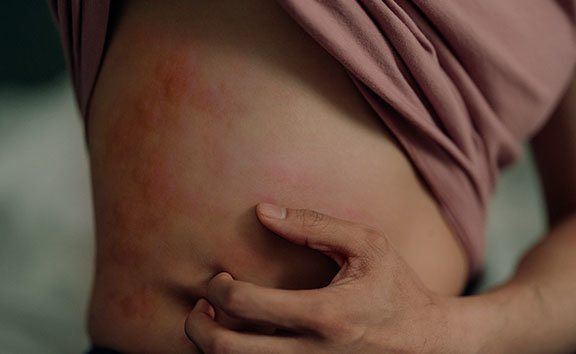
1. An overactive immune system
1. An overactive immune system
While the exact cause of your CSU is unknown, it's believed to start with the immune system getting confused by an unknown internal cause and mistakenly reacting to an internal trigger.

Chronic spontaneous urticaria (CSU), also known as chronic hives with no known external trigger, is a condition characterized by hives, swelling, or both for more than 6 weeks.
Actor portrayals.
While it is natural to look for causes for your chronic hives, CSU isn’t caused by an allergy or external trigger, so what you ate, wore, or touched does not start or trigger your flares, but some may worsen symptoms. Chronic hives is thought to be linked to an overactive immune system. It is different from other forms of hives or swelling that can be triggered by external factors such as foods, cold, heat, and sweat.
Chronic hives can show up anywhere on the body. They are sometimes accompanied by swelling—also called angioedema—of the lips, eyelids, hands, feet, and other areas. Both hives and swelling can make people feel miserable and impact many aspects of their lives.
Clarifying chronic hives
Dr Payel Gupta sets the record straight on common myths and misconceptions about chronic hives.
Dr Gupta received compensation from Novartis Pharmaceuticals Corporation.
Take a closer look at the science of CSU with the "What's Really Driving Your Chronic Hives?" guide.
*Calculated estimate.
It’s frustrating that it can sometimes take over 2 years to get a chronic hives diagnosis or treatment. If you still have questions or concerns, don't give up. Talk to your health care provider. Find out about current management approaches.
Itchy hives and swelling are common symptoms of chronic hives. However, there are actions you can take to help manage your condition.
Download Understanding Chronic Hives to get key information on chronic hives, management, and getting the most out of discussions with your health care provider.
The reality is that living with chronic hives goes way beyond the physical symptoms—and you’re far from alone in this experience.
Now that you’ve learned about chronic hives, uncover 6 facts about CSU and debunk some common myths about the condition.
Get connected
Access tools and tips for managing your chronic hives.